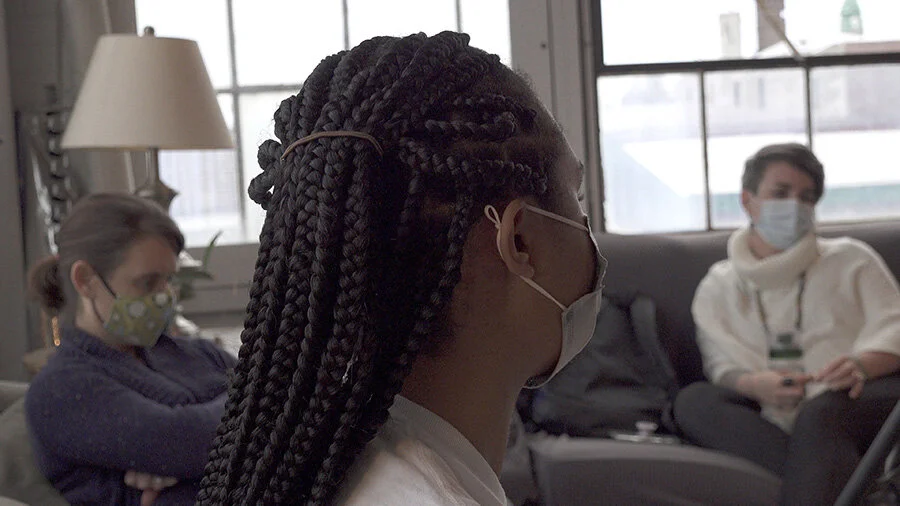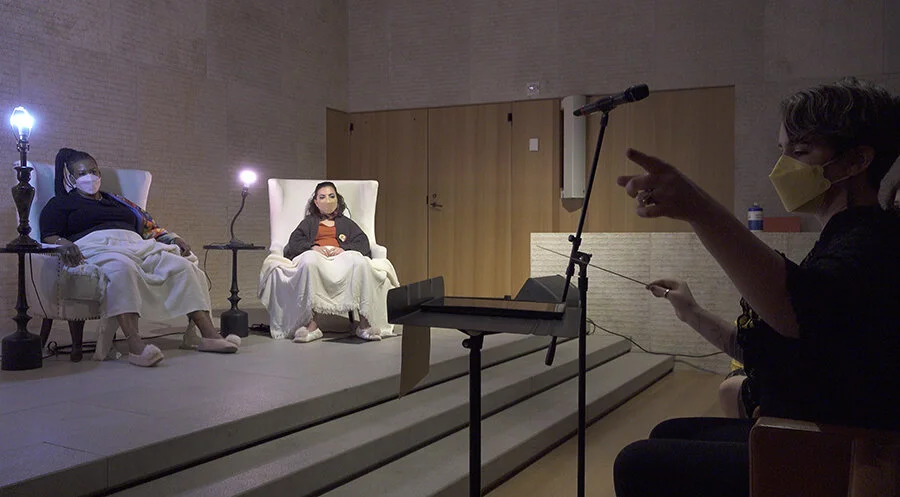Studio Visit | Althea Rao
Althea Rao – Storyteller At Large
Jenna McIlwrath
Althea Rao considers herself “a storyteller at large.” [1] A young multiform conceptual artist currently based in Philadelphia, PA, Rao’s focus is on social justice. Of her work, she asks, “What are the things that I’m outputting? And if I actively consider what I’m doing is outputting, then I need to consider how on the receiving end people can easily get into the narrative or the storyline.”
Rao grew up in Beijing, China and was drawn to creative outlets from a young age. Both of her parents were journalists and supported her interest in writing. She received a BA in Journalism from Fudan University in Shanghai, a BA in International Liberal Studies at Waseda University in Tokyo, and a Film and Media Arts MFA at Temple University in Pennsylvania. While studying in Japan, she became interested in filmmaking when she took a class about documentary and anthropology. That is when Rao started looking into film schools in the United States. She enrolled in a Film and Media Art program at Temple University. During her studies, an independent project led her towards performance and installation art.
After graduating from Temple, Rao was selected by the Halcyon Arts Lab for their Art and Social Impact Fellowship in Washington, D.C. in 2018. The fellowship was her introduction to socially engaged art, a genre that she now uses to define her practice.
During her residency at Halcyon Arts Lab, Rao created Pillar of Salt: Illuminated History in Writing, a series of interactive installations that encouraged participants to respond to writing prompts about gender inequality. Rao then made light sculptures out of the collected responses to illuminate personal relationships with gender stereotypes.
Althea Rao in her studio, Washington, D.C. 2018-19. Credit: Xueying Chang.
Since 2018, Rao has held multiple fellowships and residencies including Artist in Residence at Artspace in New Haven, CT (2019); Toolmaker in Residence at Signal Culture in Owego, NY (2020); and Hybrid Arts Lab Fellow at Theater Mitu in New York, NY (2020). Rao is an international artist and therefore a traveling artist, always staying busy partially to “maintain an active itinerary for visa purposes.” She explains that unlike other community-based artists, she rarely has the luxury of having a personal connection to the cities she works in. “I need to prepare to enter a community and not over position myself as someone who belongs there, form a trusting relationship with the people, and work with them for a while and make it very clear that I’m going to exit and [they] are going to be on [their] own,” she said. And since Rao’s work and location is always changing, so is her workspace. According to her, she is “not committed to any particular format or medium.”
Social engagement is a key feature in Rao’s work. She said, “A lot of the work that I’m doing these days is around disinformation and misinformation, … and stigma.” One of her current projects is a series of drawings and installations called The View, which features a frontal view of the vagina in settings such as birthing and examinations. Rao is a purpose and impact-driven person and that, to a certain extent, she includes self-expression in her work when she believes it is something worth people knowing.
She explained, “When I’m expressing my dissatisfaction about [social injustice], my ultimate goal is to communicate with people who are holding those existing standards and so we can have a conversation … Rao continued, “Expressing myself is never an end. I do want to make sure that everything that I make has a very full and sustainable pathway, and not only shocked people at the beginning but also hand hold them until they arrive at the other end.”
Vagina Chorus rehearsal. Credit: Qiong Wang.
Rao’s current project, Vagina Chorus, is a performance ensemble that was conceptualized during her residency in Washington D.C. She began working on the project in New Haven, and has recently found a home for the performance in Philadelphia. Performers use pelvic floor trainers to enable bio feedback that creates music through connected technology.
While working on Pillar of Salt in D.C., Rao came across a device for internal pelvic floor training that connects to a smartphone. She said, “I like interfaces between human and environments that are fluid, so I could see the potential of this wearable device becoming an input that takes changes of conditions data from user and then turn those interactions into sound or visual.” The idea of creating a chorus developed through that line of thinking. As Rao researched urinary incontinence and pelvic floor health, she was fascinated by statistics of a lack of prioritizing pelvic health.
Gender justice and stigma — themes that are consistent in her work — are prominent in Vagina Chorus. Rao wanted to include anyone with a vagina, not just women. And when the project began in New Haven, she wanted to address the financial barriers associated with pelvic health and work with people who do not have proper access to pelvic care. Rao planned on working with a group of formerly incarcerated women but discovered that not everyone is suited to be a part of this project. Those with trauma or instability may not be able to do this kind of work with pelvic floor training because of the feelings it might bring up.
Vagina Chorus Performance, 2021. Credit: Qiong Wang.
Rao pointed out, “You can't really assume what is good for the community. It really needs to be based on a lot of conversation, like actual understanding and negotiation before you can make that decision.” With a group of women performers in Philadelphia, Vagina Chorus told a musical story on November 12, 2021, at the Barnes Foundation.
Rao’s next stop is taking Vagina Chorus to Alabama, and possibly more states in the future. Wherever her career takes her and whatever shape it might take, Rao is ready to affect change in communities. At the end of the day, no matter what work she is doing, Althea Rao is telling a story.
[1] All quotes are from an interview of Althea Rao conducted by Jenna McIlwrath on November 6th, 2021, via Zoom.
Jenna McIlwrath
Jenna McIlwrath will graduate from the University of New Haven in May 2022 with a B.A. in Music & Sound Recording. A singer-songwriter with experience interning in the music industry, McIlwrath is passionate about sustainability, the environment, and mental health. Specific fields of interest include singing/performance, songwriting, music publishing, creative writing, and environmental sustainability in the music industry.






